Welcome to SCUBA News. If you'd like to tell us about your diving holiday, or send us some photos, please do - email news@scubatravel.co.uk.
You can download a pdf version here.
 | Marvellous Marshall Islands Remote; very remote. Home of the wrecks of Bikini Atoll including the Saratoga - voted one of the best wreck dives in the world. Also fabulous walls and reefs, and part of the biggest shark sanctuary in the world.
Read More…
|
|
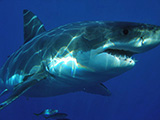 | Diving Magical Mozambique There is some incredible diving in Mozambique. The Bazaruto archipelago has been a protected area since 1971. Here you can find dugongs, dolphins, whales and turtles. In Tofo, Inhambane you can see whale sharks and manta rays. Nacala to the north of Mozambique is a beautiful area with a great diversity of sealife and the Quirimbas National Park lies along the north east of the country.
Read More…
|
|
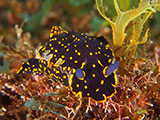 | Portugal, Madeira and the Azores As well as the diving around mainland Portugal, there is splendid diving in the Azores and Madeira archipelagos which sit way out in the Atlantic.
Read More…
|
|
Letters
San Andres, Colombia
I just came back from a week on San Andres island staying at the camera and resorts. San Andres has some of the best diving I have done around the world - the Decamaron has multiple dive shops and very well educated and trained crews. There are many great dive sites from beginning open water diving all the way up to advanced and technical dives. I will definitely be returning.
James
More on diving San Andres
Cave Diving Course, Mexico
I did a cave diving course (cavern to full cave) plus sidemount training with Eric who owns Beyond Diving and this was the best, yet hardest course I have ever taken. Extremely rewarding and I feel super proud to have done this course. I don't think I could have picked a better instructor to do my training with. While the courses are not cheap, they shouldn't be. I think I got exactly what I paid for, if not more.
Tom Janesky, USA
More on diving Mexico's Cenotes
Featured Liveaboard - The Phinisi
Save 20% on Diving Thailand on the classic Phinisi schooner
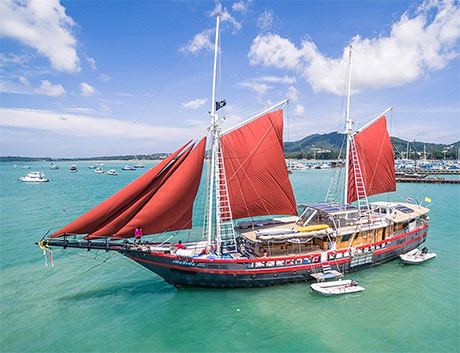
Special offers in November and December - a good time to dive Thailand's best sites.
Learn More…
Young Golden Trevally are strikingly coloured, their gold and black striped garb showing from where their name comes. These young fish like to seek out large animals like sharks, groupers and dugongs for protection, acting as pilot fish. Sometimes they make a mistake and decide that a diver is the perfect companion. They will hover close to the tank for the entirety of a dive and until the diver finally has to say goodbye and emerge from the water, leaving the fish to swim quickly back to the relative safety of the reef to wait for another passing prospect.

Juvenile Golden Trevally with Diver. Photo credit Jill Studholme.
Some young trevally prefer to live as symbionts among the tentacles of jellyfish. When not following larger animals, or living in a jellyfish, the fish shoal together.
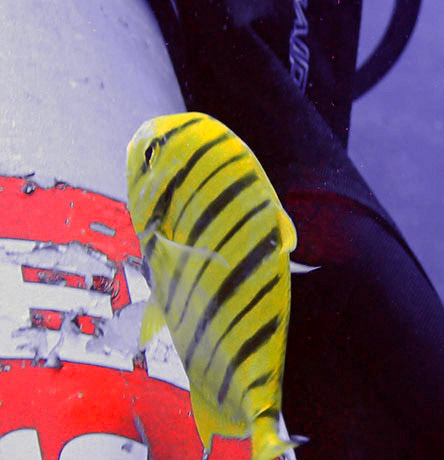
Juvenile Golden Trevally. Photo credit Jill Studholme.
Golden Trevally live throughout the Indo-Pacific from the Red Sea to Baja California and South Africa. When mature they grow as long as 120 cm. You see them in deep lagoons and seaward reefs. They root about in the sand for invertebrates and fishes, the mouth forming a tube to suck up their food.
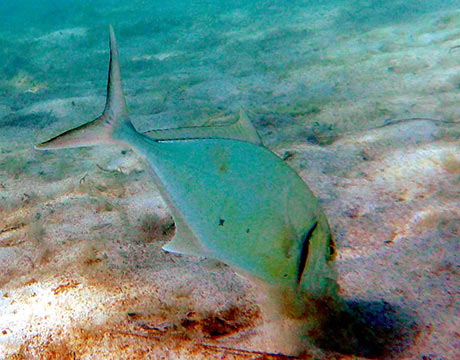
Adult Golden Trevally. Photo credit Kare Kare (CC BY 3.0).
Their scientific name, Gnathanodon speciosus, comes from the Greek - Gnathos which means jaw and odous which means teeth. Actually, the adults have no teeth at all. Speciosus is from the Latin meaning showy. This species is the only one in the Gnathanodon genus. The Golden Trevally has many other common names, including Golden pilot jack.
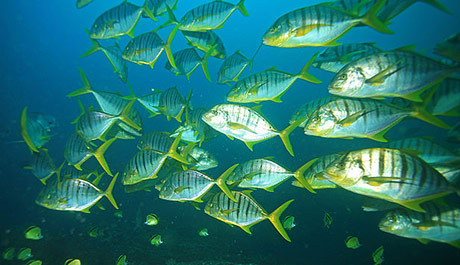
Shoal of sub-adult Golden Trevally. Photo credit Laszlo Ilyes (CC BY 2.0).
The Trevally family (Carangidae) contains around 140 species. Many have a metallic sheen on their skin, caused by numerous mirror-like platelets of guanine crystals which reflect light. Normally trevally hunt in schools, circling smaller fish and gradually tightening the circle - catching any fish that tries to escape. Our adult Golden Trevally snuffling about in the sand is an exception.

Juvenile Golden Trevally with Dugong. Photo credit Suzanne Challoner.
Class: Actinopterygii > Order: Perciformes > Family: Carangidae > Genus: Gnathanodon > Speicies: Gnathanodon speciosus
References and Further Reading:
Coral Reef Guide Red Sea Reef, Ewald Lieske and Robert Myers
Red Sea Reef Guide, Helmut Debelius
Our round up of the best underwater news stories of the past month. For breaking news see our Twitter page or RSS feed
 | Male-to-female sex change happens first in the brain, in clownfish at least
Clownfish mate for life. All clownfish start off as male, but switch to female when, for example, the only female present dies or disappears. In a new study, researchers found that the sex-change occurs in the fish's brain months or even years before the gonads change. |
|
 | Blue sharks use eddies for fast track to food
Blue sharks use large, swirling ocean currents, known as eddies, to fast-track their way down to feed in the ocean twilight zone--a layer of the ocean between 200 and 1000 meters deep containing the largest fish biomass on Earth, according to new research |
|
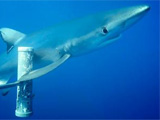 | Industrial fishing behind plummeting shark numbers
Research finds marine predators are significantly smaller and much rarer in areas closer to people |
|
 | Where did all the cod go? Fishing crisis in the North Sea
With an international council now on the brink of declaring the species unsustainable - hat is the future for cod? |
|
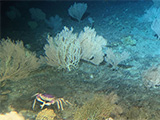 | Researchers find depleted seamounts near Hawaii recovering after decades of federal protection
For decades, overfishing and trawling devastated parts of an underwater mountain range in the Pacific Ocean near Hawaii, wrecking deep-sea corals and destroying much of their ecological community. But now, after years of federally mandated protection, the area is making a comeback. |
|
 | Japanese Whaling Is Not the Greatest Threat to Whale Conservation
Global outrage should focus on North American fishing and shipping industries as well |
|
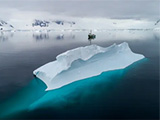 | Whales older than Moby Dick
There are whales alive in the Arctic today that were born before Moby-Dick was published in 1851. Despite this extraordinary fact, humans kill about 300,000 whales, dolphins and porpoises every year - most die indiscriminately when they get caught up in fishing gear. |
SCUBA News is licensed under a Creative Commons Attribution 4.0 Unported License. This means we are happy for you to reuse our material for both commercial and non-commercial use as long as you: credit the name of the author, link back to the SCUBA Travel website and say if you have made any changes. Some of the photos though are copyright the photographer. Please get in touch for advice.
Photo credits: Tim Nicholson, Jill Studholme, Kare Kare, Laszlo Ilyes, Suzanne Challoner
Previous editions of SCUBA News are archived at https://www.scubatravel.co.uk/news.html
SUBSCRIBING AND UNSUBSCRIBING
Visit Unsubscribe and add or remove your e-mail address. To change whether your receive the newsletter in text or HTML (with pictures) format visit this link
ADVERTISING
Should you wish to advertise in SCUBA News, please see the special offers at
https://www.scubatravel.co.uk/newsad.html
Other advertising opportunities are at
https://www.scubatravel.co.uk/advertising.html
CONTACTING THE EDITOR
Please send your letters or press releases to:
Jill Studholme
SCUBA News
The Cliff
Upper Mayfield
DE6 2HR
UK
news@scubatravel.co.uk
PUBLISHER
SCUBA Travel Ltd, 5 Loxford Court, Hulme, Manchester, M15 6AF, UK
No comments:
Post a Comment